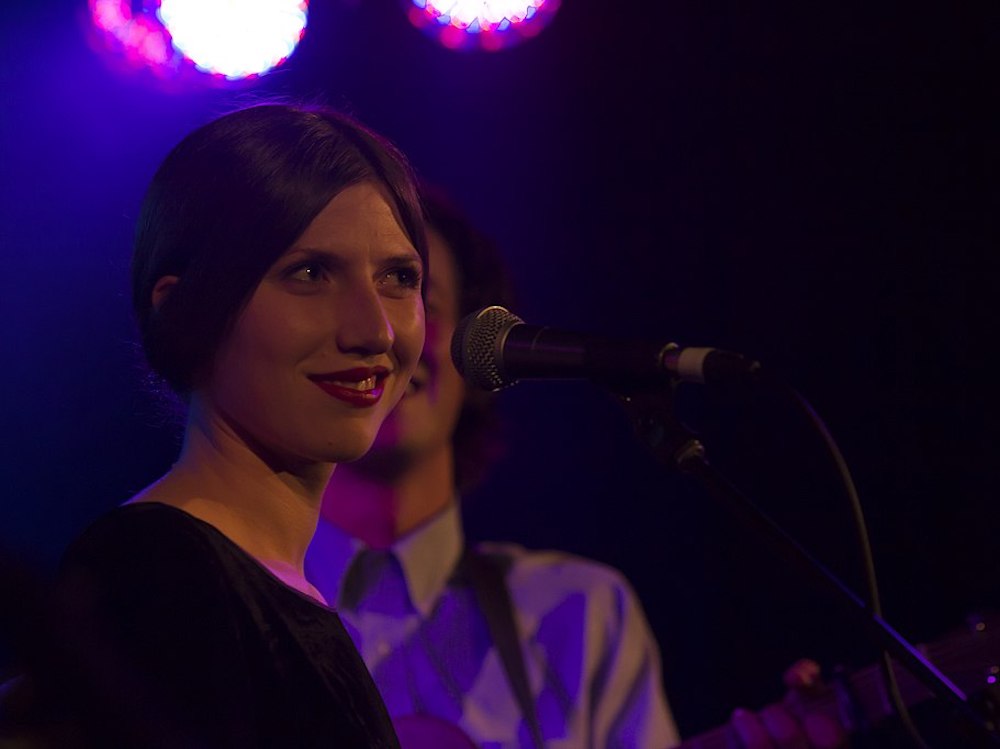
Aldous Harding performing at the Oxford Art Factory on November 21, 2015. Photo: Bruce Baker (CC BY 2.0 (https://ift.tt/2HnEhxc). Via Wikimedia Commons.
Aldous Harding is a young singer-songwriter, the kind usually labeled a folk musician, but she’s been more fittingly described as “New Zealand’s woman of a thousand voices.” She grew up in Lyttelton, a town near Christchurch, and was discovered while busking in the streets. On her self-titled 2014 debut, she has a high, tremulous voice that’s subtly lisped and bent into an accent, and the tone across songs is uniform—subdued, eerie, a vague mood of the medieval. But on her second album, Party (2017), and again on Designer (2019), released at the end of April, her voice splays. Tonally, it might sound as if she’s blowing into a glass bottle at first—every note shored up on warm bass—then she’ll pull some invisible ripcord in the pre-chorus, and a sustained wail will spring out, cutting through everything like bladed ice.
I first encountered Harding while I was living in England a few years ago. The weather was gray, the political situation was dire, and my bike kept doing this thing where the pedals would lurch, and my ribs would get crushed on the handlebars. I bought a helmet and a heavy rain jacket, indoctrinated myself on the pleasures of lukewarm ale, and eventually began looking online for new music—something dark that would hopefully confirm and condense the British situation.
Harding’s songs are not just sad and morose; they’re funereal. Every note climbed out of my speakers like a black vine, curving its way around my flat until the walls breathed a kind of death chill. I felt I should be lighting rows of candles or wearing a suit. Her lyrics and track titles alone relay that skulls are swelling, stones are being cuddled, birds are not singing but screaming, and someone has broken their neck while “dancing to the edge of the world.”
There’s also her face. When she sings, her eyes wheel around ballistically in their sockets, her teeth grit into a grimace, and her lips purse in this muscular way, as if clenching around gravel. The unspoken coordination of features somehow seems orchestral, complex. It’s totally mesmerizing. Even the promotional literature that circulates with her live show explains that she “does more than sing”—her body and face are a “weapon of theatre.”
While undergoing the English winter, I’d occasionally watch a slice of a live performance online between emails, and before I knew it, I was singing along. My lips would curl in unfamiliar directions, my nose would rumple, my eyes would swerve. I was gone, somewhere, and the features of my face were rolling around like meatballs and peas on a dinner plate.
I wanted to tame, or at least make sense of, the new habit. I read some journal articles about physiognomy, started seeing faces everywhere, and noted conversations and passages of literature that centered on countenance. What struck me was the general tendency to itemize and appraise. A face, it would be said, had dark eyes and fist-like cheekbones and a broad marmoreal brow; or it looked familiar, “open,” beautiful, somber. That privileged portion of the body—the flesh that makes us swiftly recognizable, lovable, detestable—fosters a kind of talk that’s oddly prone to effacement. Either the face, as a whole, drowns under the flood of adjectives and particulars, or attractiveness and emotion are ascribed to features that conceal vast inner life.
The wonder of Harding is that her performances suggest another language of the face. Her many faces fall between the cracks of recognizable emotions and rarely seem to express turmoil or the felt sentiment buried in the songs. Instead, they supplement the music. She employs her face to present a carefully steered choreography, disjoined from the meanings of words and yet fused to the melodies, driving them into stray and unpredictable emotional registers.
I went to see Harding perform live for the first time in April at Rough Trade, a block from the Brooklyn waterfront. I spent most of the performance slack-jawed. I forgot I was holding a drink for thirty minutes. I’ve been riveted by other faces—faces of musicians like Benjamin Clementine and actors like Gottfried John—but Harding was so unregenerately weird on stage that I felt scalded. The terror-struck eyes, the toothy grimace, the wry smiles, the unswerving conviction and cool—I had never seen a face moved, or composed, like this.
Between songs, my friend Hannah pulled out her phone to show me a video she’d made. It was of her wearing a creepy mask, like the one Harding wears in the music video for her song “The Barrel.” I looked up from the phone and tried to find some resolute trace of a “real” Harding in the flickering between faces. There were just masks, and she had slipped away behind them, accomplished something like Maskenfreiheit—that “freedom conferred by masks”—with her face alone.
Harding has said in interviews that she’s “obsessed” with her appearance at shows. There seems to be a virtue in that sort of attention, a focus on live performance when most of our music is Bluetoothed into our ears—voices disembodied, whispering through headphones. I can walk through the subways and streets of New York, listening to Harding, and every song is nourished by the bold memory of a face.
Zachary Fine is a writer from New Orleans.
from The Paris Review https://ift.tt/32g2fEV
Comments
Post a Comment